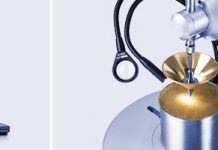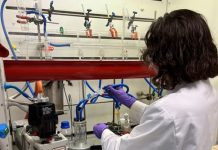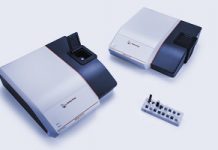Aston Institute for Membrane Excellence (AIME) has hosted its official academic launch at Aston University, with more than 100 guests and international speakers in attendance.
Guests included chemistry, biology, physics and engineering academics from UK universities, international collaborators, regional partners, industry representatives, funders and business partners.
AIME is a globally unique, cross-disciplinary institute to develop novel biomimetic membranes, set up with a major grant of £10m from Research England.
The AIME team will focus on the development of bioinspired, highly selective polymer structures for applications in water purification and waste remediation, nanoparticles loaded with therapeutic molecules to treat disorders ranging from chronic wounds to neurological injuries, and the purification of individual membrane proteins with polymers to study them as drug targets.
AIME co-lead Professor Roslyn Bill, from the School of Biosciences, with fellow co-lead Professor Paul Topham from the department of Chemical Engineering and Applied Chemistry (CEAC), gave an introductory address explaining how the different research disciplines complement each other.
Professor Bill’s research focuses on aquaporin-4 proteins in brain cell membranes, which move water in and out of brain cells and are an important drug target to treat traumatic brain injury and the catastrophic swelling that results from that. Professor Topham has developed polymer discs that can extract aquaporin-4 from cell membranes, allowing drug testing.
Professor Bill said of the Research England funding, “The funding allows biologists and chemists to cross-fertilise each other’s membrane science.
“For example, Paul’s team can take tiny discs that contain the membrane proteins that we’re interested in as biological drug targets and stitch the molecules together to make them into water purification membranes.”
Sustainable polymer chemistry was the topic for Professor Andrew Dove, a professor of sustainable polymer chemistry at the University of Birmingham. Currently the UK recycles around 10% of its plastic, though it has a target of 40%. He discussed the importance of designing for end-of-life, recycling options, upcycling polymers into new materials, and the use of biobased plastics.
Another talk, ‘Bridging the interdisciplinary gap: what exactly is a “membrane”?’ was introduced by Dr Torsten Bak Regueira, chief technology officer at Danish biomimetic membrane company Aquaporin and a visiting professor at Aston University. The company develops domestic and industrial water purification membranes based on highly efficient aquaporin proteins.
Dr Regueira said, “The key to creating our cutting-edge membrane was to bring people from different expertise fields together. The things that we have focused on at Aquaporin are protein chemistry, polymer chemistry and membrane chemistry. All these areas are needed in building the membrane.
“We wanted to break down the barriers between the disciplines and the collaborative environment at Aquaporin allows us to create solutions that wouldn’t otherwise be possible. AIME is doing exactly that.”
Demonstrating how the AIME researchers are learning each other’s languages, Dr Matt Derry, a senior chemistry lecturer, presented the biological aspects of AIME’s membrane research, while Professor Alan Goddard, a biotechnology professor, explained the chemical side of the polymerisation techniques needed to create the polymer membranes.










